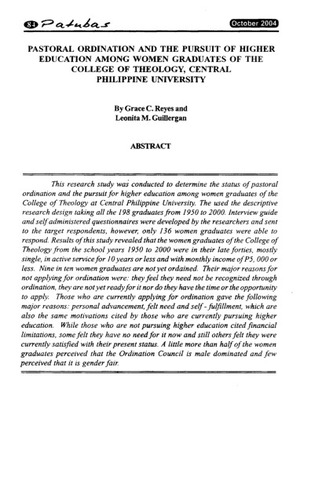Ipakita ang simpleng tala ng item
Pastoral ordination and the pursuit of higher education among women graduates of the College of Theology, Central Philippine University
| dc.contributor.author | Reyes, Grace C. | |
| dc.contributor.author | Guillergan, Leonita M. | |
| dc.date.accessioned | 2021-03-25T05:53:29Z | |
| dc.date.available | 2021-03-25T05:53:29Z | |
| dc.date.issued | 2004-10 | |
| dc.identifier.citation | Reyes, G. C. & Guillergan, L. M. (2004). Pastoral ordination and the pursuit of higher education among women graduates of the College of Theology, Central Philippine University. Patubas, 1(2), 78-87. | en_US |
| dc.identifier.issn | 1908-515X | |
| dc.identifier.uri | https://hdl.handle.net/20.500.12852/690 | |
| dc.description | Journal article | en_US |
| dc.description.abstract | This research study was conducted to determine the status of pastoral ordination and the pursuit for higher education among women graduates of the College of Theology at Central Philippine University. The research used the descriptive research design taking all the 198 graduates from 1950 to 2000. Interview guide and self-administered questionnaires were developed by the researchers and sent to the target respondents, however, only 136 women graduates were able to respond. Results of this study revealed that the women graduates of the College of Theology from the school years 1950 to 2000 were in their late forties, mostly single, in active service for 10 years or less and with a monthly income of P5, 000 or less. Nine in ten women graduates are not yet ordained. Their major reasons for not applying for ordination were: they feel they need not be recognized through ordination, they are not yet ready for it nor do they have the time or the opportunity to apply. Those who are currently applying for ordination gave the following major reasons: personal advancement, felt need, and self-fulfillment, which are also the same motivations cited by those who are currently pursuing higher education. While those who are not pursuing higher education cited financial limitations, some felt they have no need for it now and still others felt they were currently satisfied with their present status. A little more than half of the women graduates perceived that the Ordination Council is male-dominated and few perceived that it is gender-fair. | en_US |
| dc.language.iso | en | en_US |
| dc.publisher | Central Philippine University | en_US |
| dc.subject.lcsh | Ordination | en_US |
| dc.subject.lcsh | Ordination of women | en_US |
| dc.subject.lcsh | Ordination of women--Christianity | en_US |
| dc.subject.lcsh | College graduates | en_US |
| dc.subject.lcsh | Clergy | en_US |
| dc.subject.lcsh | Women clergy | en_US |
| dc.subject.lcsh | Central Philippine University | en_US |
| dc.title | Pastoral ordination and the pursuit of higher education among women graduates of the College of Theology, Central Philippine University | en_US |
| dc.type | Article | en_US |
| dc.citation.firstpage | 78 | en_US |
| dc.citation.lastpage | 87 | en_US |
| dc.citation.journaltitle | Patubas | en_US |
| dc.citation.volume | 1 | en_US |
| dc.citation.issue | 2 | en_US |
| local.subject | Central Philippine University (CPU). College of Theology. | en_US |
Mga file sa item na ito
Lumilitaw ang item na ito sa mga sumusunod na (mga) Koleksyon
-
Journal articles [28]
-
Patubas [110]
Patubas is a refereed research journal of Central Philippine University.


